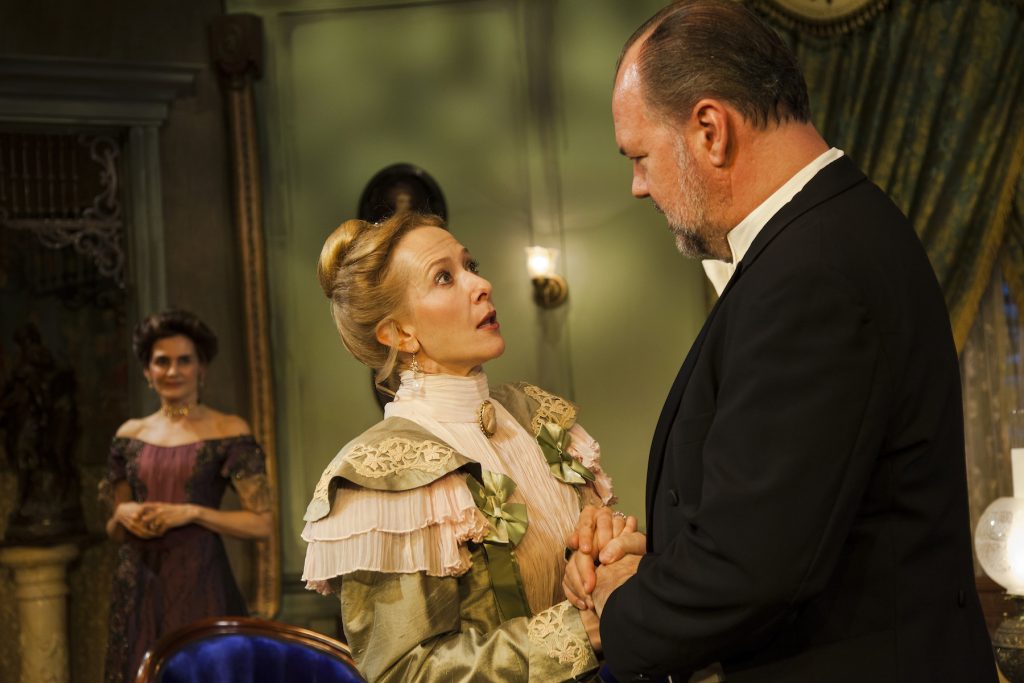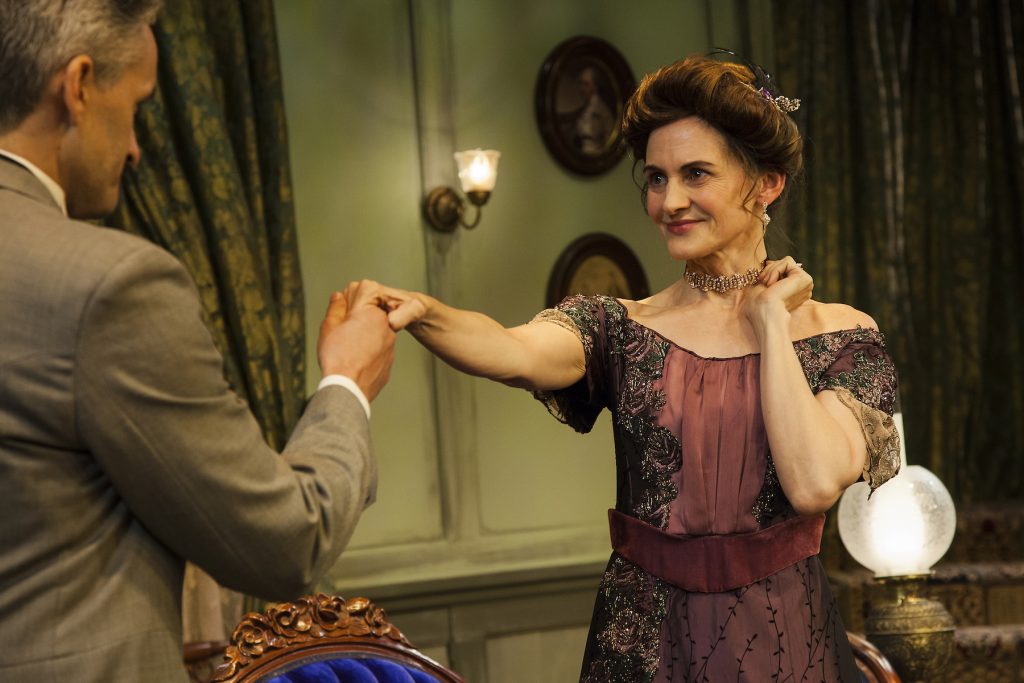
Playwright Lillian Hellman created a classic of twentieth century drama while quietly hurling rocks at her forbears in a play allegedly drawn from the avaricious and plain vicious personalities of her Alabama relatives, the Marx and Newhouse families. Interestingly, the title of the play, suggested by Dorothy Parker, comes from the Bible. As the Song of Solomon, Chapter 2, Verse 15 opines, “Take us the foxes, the little foxes, that spoil the vines: for our vines have tender grapes.” These “little foxes,” the Hubbard brothers, Benjamin (Mike McShane) and Oscar (Rob Nagle), and their sister Regina Hubbard Giddens (Deborah Puette) are truly a hazard to anyone unlucky enough to be in their sphere of influence.

Set in Alabama in 1900, THE LITTLE FOXES wages a war of values between Southern aristocracy and Northern pragmatism as the Hubbards try to survive and thrive following the Civil War. THE LITTLE FOXES also suggests the fallout from some accepted beliefs of the time. Since only sons were considered legal heirs, Benjamin and Oscar inherited their father’s considerable wealth and built that nest egg into two separate and formidable fortunes. Unfortunately, their sister, as a female, was cut out of the will and so had to make her own way. In her day and age, that meant marriage; and Regina charms and weds Horace Giddens (John De Mita) – a man she does not respect or love. The effect of her enforced subservience and second-class options leaves Regina a bitter and conniving individual.

But Regina is not the only woman for whom marriage proves to be a trap. Oscar’s wife Birdie (Jocelyn Towne), wed for her family’s plantation and cotton fields, is a timid and abused wife who has turned to alcohol to cope. Even her oily son Leo (Calvin Picou) is a disappointment, proving the adage that an acorn does not fall far from the paternal tree. When an arranged marriage is proposed between first cousins Leo Hubbard and Alexandra Giddens (Kristin Couture) in order to consolidate the family fortunes, Birdie – who adores the Giddens daughter – is beside herself.

As THE LITTLE FOXES opens, the greedy Hubbard brothers have a scheme in mind to multiply their fortunes which entails the very profitable enterprise of bringing together their cotton fields and the cotton gins manufactured in the North by William Marshall (Timothy Adam Venable). They need only $75,000 (equivalent to approximately two million bucks in today’s market) to seal the deal. Where to get the cash? As Regina works desperately to manipulate her very ill, wheelchair-bound husband into forking over the needed cash, her hopes and dreams for the future begin to take form.

THE LITTLE FOXES is a tale of tarnished dreams, blackmail, evil deeds, family abuse, fallen aristocracy, all the things that make these characters so interesting – especially Regina, who will do anything to get what she wants. The world is changing rapidly, and “the little foxes” plan to change with it. As Northern capitalism inundates the South, Benjamin Hubbard remarks, “There are hundreds of Hubbards sitting in rooms like this throughout the country. All their names aren’t Hubbard, but they are all Hubbards and they will own this country someday.” Prophetic words indeed.

In addition to the noteworthy skills of director Cameron Watson and the brilliant portrayals by these absorbing characters – each trapped in his own little cocoon – John Iacovelli’s elegant scenic design deserves special notice. Terri A. Lewis’ exquisite costume design also lures the audience into this moment in history. Not only is THE LITTLE FOXES a fascinating study of a time gone by whose characters may find clones in today’s world – but also the entire production is a treat to the eyes.

SPLASH SELECTION
THE LITTLE FOXES runs through December 10, 2018, with performances at 8 p.m. on Fridays, Saturdays, and Mondays and at 2 p.m. on Sundays. The Kiki and David Gindler Performing Arts Center is located at 110 East Broadway, Glendale, CA 91205. Tickets are $35. For information and reservations, call 818-0506-1983 or go online.




Be the first to comment